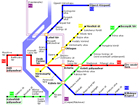Hungary's greatest series of cultural events ever began with a
spectacular opening ceremony
PĂ©cs, January 10th,
2010 â?? The year of the PĂ©cs2010
European Capital of Culture Programme began with a spectacular production built
upon the forces of openness, receptiveness, tradition, innovation and community
effort. 450 of the cityâ??s students, artists and celebrities connected to PĂ©cs
brought to life together the various facets of the cityâ??s cultural history,
during the ceremony held in the refurbished Széchenyi Square: all the values,
results, and the two-thousand-year-old cultural heritage that will be a vital
part of the year-long series of events.
Thousands of guests arrived from Hungary and from
abroad already the days before the event to attend this unparalleled opening
event filled with carnivalistic and theatrical elements, and hundreds of
tickets were sold for the MĂV Nostalgia Theme Train - named Sopianae (the Roman
name of PĂ©cs) in honour of the programme -, which left Budapest to take the
guests to the cultural capitalâ??s opening event on January 10th. Before the
opening ceremony, in the presence of representatives of the Hungarian and
international media, Hungarian Prime Minister Gordon Bajnai, Minister of
Education and Culture IstvĂĄn Hiller, Mayor of PĂ©cs Zsolt PĂĄva, Managing
Director of Hungarofest Ltd. Rita Rubovszky, Csaba Ruzsa Managing Director and
TamĂĄs Szalay Cultural Director of the PĂ©cs2010 European Capital of Culture
programme presented the details of the programmes of the year organized by the
City of PĂ©cs, PĂ©cs2010 Management Centre and Hungarofest Nonprofit Ltd at a
press conference held for the representatives of international press.
During the event the special sheet of stamps was
presented, which the Hungarian Post Office issued on January 10th, 2010 in
honour of PĂ?CS2010 European Capital of Culture. The 25 different stamps feature
sights of the city of PĂ©cs.
The Borderless City Opens its Gates
In 2010, as European Capital of Culture, PĂ©cs awaits visitors with hundreds of
programmes. The colourful, exciting events and festivals will be housed by the
squares and buildings of enormous historical value of the two-thousand-year-old
city, made unique by the contemporary works of art and performances that
determine the current image of PĂ©cs. In 2010, everyone who will visit one of
the countryâ??s most significant university cities, proud to host 35-thousand
Hungarian and foreign students, will be able to meet the most brilliant
creations of the Hungarian and European culture, learn about the arts of the
neighbouring Balcanic people, and enjoy the unique atmosphere of the wonderful
sub-Mediterranean, all at the same time.
PĂ©cs Builds for the Long Term
In addition to the cultural programmes, PĂ©cs is preparing with key investments
worth HUF 35 billion, with Hungaryâ??s greatest ever culture-based urban
development. Several of these developments are closely connected to this yearâ??s
programme. The more than 70 city areas being refurbished, the central squares
and parks being revived will not only make the city more liveable for its
citizens, but will also allow the visitors to enjoy the cultural programmes in
a unique setting. The Zsolnay Cultural Quarter, the Conference and Concert
Centre, the Grand Exhibition Space and the â??Museum Streetâ? will play a major
role already in 2010, as venues for cultural programmes, whereas the South
Transdanubian Regional Library and Knowledge Centre, even though it opens its
gates in 2010, is definitely built for the future.
One of the key elements of the cityâ??s winning application
titled â??Borderless Cityâ? is cultural innovation, which could multiply PĂ©csâ??s
already existing touristic appeal. In all of this, 2010 is only the beginning.
The PĂ©cs2010 European Capital of Culture programme â?? as the authors of the
application had originally hoped â?? in addition to its â??ownâ? key investments and
to the construction of the M6 motorway, is triggering further developments in
the city and in the region. Several hotel development plans are being realized,
so that more four-star accommodations will await the visiting tourists. In the
framework of the South Transdanubian Operational Programme there are other
developments connected to the PĂ©cs2010 European Capital of Culture Programme
being realized in various towns in the region. Some of the key investments of
the region are the Renaissance Theme Park of Bikal, as well as the water theme
park and sports centre being built in OrfƱ, or the development of the Harkåny
spa into a health resort complex.
The marketing activity of the domestic and international
network - covering 20 countries - of the Hungarian National Tourist Office
places great emphasis on promoting PĂ©cs as European Capital of Culture, in
Hungary and abroad alike, this year in the framework of the Year of Festivals
and already over the past two years. Therein, already more than 300 foreign
media and 100 partner agencies came personally to PĂ©cs to gather information
about the touristic offer of the city and of the region, and more than 2
million copies were published of the brochure meant to promote the cityâ??s offer
on the international market. The national tourism marketing organization
attracted several hundreds of thousands of visitors at the trade fairs, and 10
million visitors a year on the Internet.
Culture That Bonds
As the investments connected to this year are realized, the role played by PĂ©cs
within the region changes completely. However, here the region does not only
mean Southern Transdanubia, but also the international cultural region called
Southern Cultural Zone. Relying on its special geopolitical position, as well
as on its cultural assets and experiences, PĂ©cs is seeking to find its place
and intermediary role in a system of interrelations that goes beyond the
countryâ??s borders. It is a known fact that in the face of political-economic
disagreements between the nations, culture can bond people living on both sides
of the borders. Thus, a different interpretation of the word borderless means a
spiritual crossing of the border, as culture â?? using the common language of art
â?? can generate a new relationship between countries and people.
The words cooperation and collaboration gain new
meaning in PĂ©cs via the European Capital of Culture programme. The strength of
culture brings together and joins the players from all fields of life: culture
and arts, civil organizations, the economy sector and the political elite
alike. Cooperation is not merely realized on the city level, but also on
county-, regional-, governmental- and naturally European Union-level as well.
The extended network provides strong bases for the year of 2010 to become the
most important milestone of sustainable, culture-based city development.
Besides the future potential, it is the cultural
heritage of the city that made PĂ©cs appropriate and worthy to bear the title of
European Capital of Culture in 2010. The thousand-year-old bishopric, the early
Christian burial chambers which were designated part of the UNESCO world
heritage in 2000, the significant contemporary artists, the museums, or the
Bauhaus heritage are just a few examples to name.
Along PĂ©cs, Istanbul and Essen in the Ruhr Region also
hold the title of European Capital of Culture in 2010. Because of the
historical and cultural traditions it is important for each city to collaborate
with its co-capitals. With the German partners, the basis for this cooperation
rests on the existing excellent cultural relations, whereas with Istanbul, in
addition to the common past, on openness, curiosity, and initiative.


